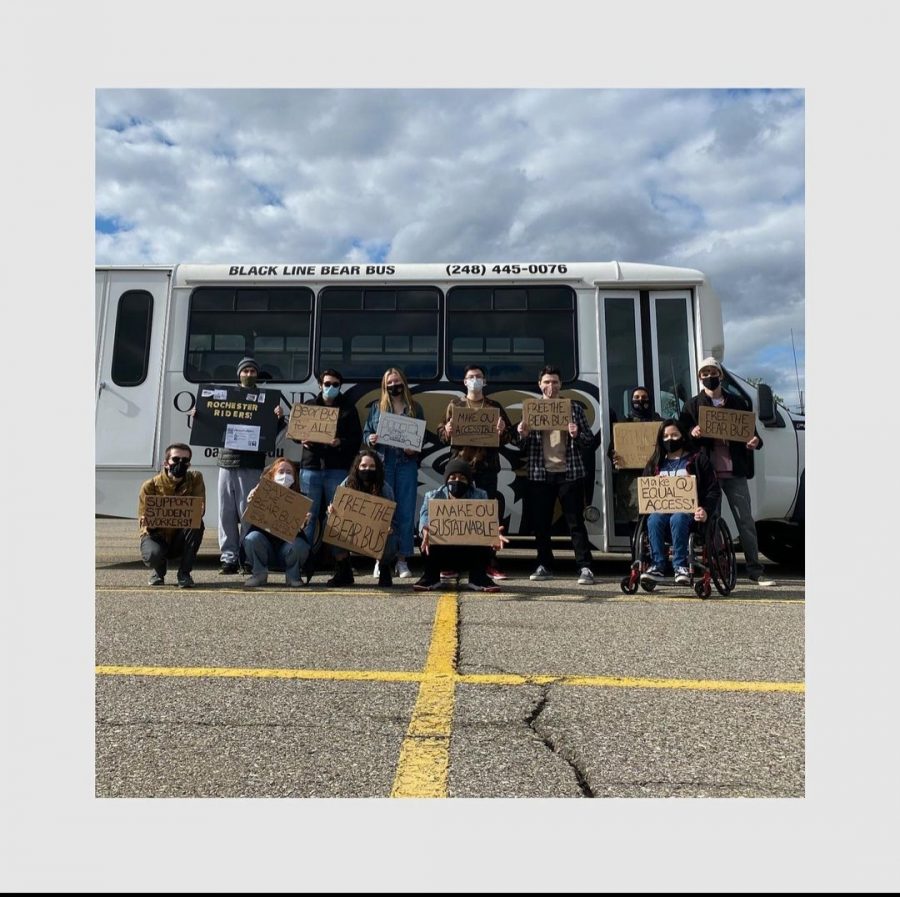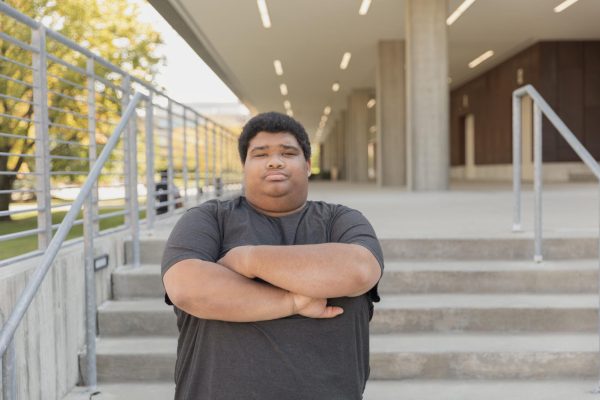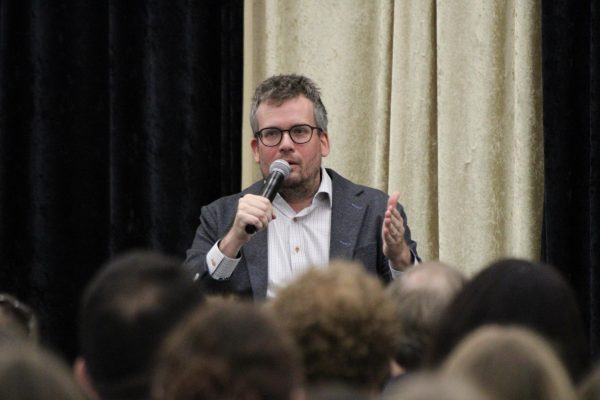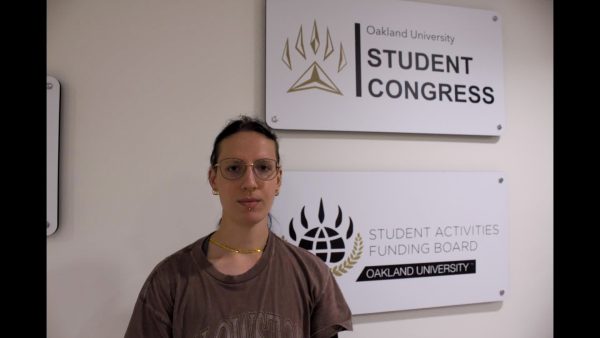Letter to the editor: Two Universities, One Playbook: How University Administrations Dismiss Worker Issues
Photo courtesy of @oaklandstudentworkers on Instagram
Oakland United Student Workers Coalition posing for a picture before a protest earlier this summer.
Prior to the COVID-19 pandemic, George Washington University (GWU) planned to make large cuts to the University which would make it less accessible to working class students and students of color. GW PSU protested this plan with our Fight Back! GW campaign. The University proposed and approved its Strategic Plan – the implementation of which paused during COVID-19. The approval of this plan, despite student and faculty protestations, demonstrates how the administration at GWU is uninterested in making an equitable community, further showcased by the University’s response to the COVID-19 pandemic.
The administration at GWU handled the challenges of the COVID-19 pandemic with a consistent disregard for the safety, security, and financial stability of its workers. When GWU’s campus shut down and in-person classes ended in Spring 2020, drivers for the VEX shuttle bus service were furloughed en masse, with little warning and no support from the University. GW PSU, with help from former VEX drivers, their supervisors, and the GWU Faculty Association, created a mutual aid fund to support the people who had been furloughed. Throughout the duration of the pandemic to-date, GWU has continued to layoff workers (primarily non-unionized workers). Facilities workers estimate more than half of their coworkers have been laid off. Workers GWU still needed to maintain the campus during COVID-19, in residence halls and other buildings, take on much greater workloads with no financial rewards or acknowledgement due to these cuts. The University does not allow for adequate COVID-19 sick leave, take all necessary precautions to prevent COVID-19 outbreaks, communicate available resources to workers, or allow workers a space to register complaints about Administrative policy. In response, GW Roosevelt, a progressive policy student think tank at GWU, created the GW Coalition for Frontline Workers’ Rights. The Coalition maintains six demands: 1) expansion of pandemic leave to 180 hours, 2) freeze layoffs during the pandemic, 3) require negative COVID-19 tests for all returning workers, 4) apply consistent COVID-19 procedures for GW workers and contracted employees, 5) create an anonymous space for workers to express concerns with GW policy, and 6) increase transparency around and accessibility of GW’s workers’ compensation program.
At Oakland University (OU), around February and March of 2021, OU Housing announced a plan to eliminate two areas of student employment, Nightwatch, which ensured the residence halls were safe and secure at night, and Sustaining Our Planet Earth (SOPE), the only program dedicated to sustainability within OU Housing. This announcement came after the previous elimination of the Bear Bus in late 2020, removal of the Academic Peer Mentor (APM) free housing benefit, and a potential hour reduction for Desk Attendants (DAs) – with much of the responsibility for the new work created being placed on Resident Assistants (RAs). After hearing of these changes, several student workers banded together to resist the job cuts by forming the Oakland United Student Workers Coalition (OUSWC). OUSWC was successful in petitioning for the reinstatement of Nightwatch and SOPE by negotiating with OU administration and communicating the concerns of student workers to the Director of OU Housing.
After the initial success of OUSWC, the OU administration has retaliated in a number of ways. To discourage future action, OU has callously terminated several members for their involvement in collective action, a clear violation of Michigan labor laws. Additionally, supervisors have told their workers to avoid any involvement in OUSWC and warned that it could be damaging to one’s position as a student employee. Furthermore, OUSWC members are consistently denied meetings with OU administration to talk about substantive issues simply for being a member – all in an attempt to snuff out the advocacy. OU’s resistance to collective action and retaliation against their own workers only serves to highlight the injustice of the system OU perpetuates. Workers must be allowed to advocate for their needs without fear of retaliation if they are to be productive in their position. Keeping workers afraid of speaking out about their concerns creates a coercive environment that is ripe for exploitation.
GW PSU and Coalition share goals with OUSWC, both working to make our respective campuses more responsive to the needs and demands of campus workers, and experienced similar tactics from GW’s and OU’s respective administrations. We believe the similar tactics, talking points, and ongoing cuts implemented by the two distant university administrations reveal their basic mindset and motivations, and can be instructive in future on-campus progressive activism throughout the US. Universities should be devoted to creating an environment that is conducive to workers being creative, productive, and efficient. This happens only when workers feel safe and cared for and they feel as though they have the ability to speak out about issues that they see in their workplace. By diminishing the power of collective action, refusing to truly acknowledge worker concerns, and intimidating workers into submission, universities exploit their workers for profit. This trend is not unique to any single university in the U.S., each administration borrows tactics from each other, and the suppression of collective action tends to rhyme.
GW and OU employ similar tactics to dismiss and diffuse student activism, and ignore worker issues. Both administrations frequently ignore student demands and deny meetings with student workers. GW has a long history of stalling student requests for meetings. During COVID-19, the University has become bolder in outright ignoring student demands. The GW Coalition for Frontline Worker’s Rights first reached out to GW’s administration in mid-October of 2020. The University met with students on this issue once, in December 2020, dismissed our concerns, and has refused to meet with us since, despite continued attempts at contact.
OU will often intimidate workers by insinuating that engagement in collective action will have negative consequences, and subsequently, illegally terminating student workers for their involvement. GW PSU members do not have knowledge of GW engaging in this kind of disruption, however, workers consistently fear retaliation if they speak out publicly about University policy, which implies some intimidation tactics which are unknown to GW PSU.
Additionally, OU quickly replaces workers after terminating them. This has the effect of making workers feel easily replaceable, which in turn makes them less likely to engage in collective action and risk termination. Many students are eager to work for their university as these jobs provide a means to afford the cost of college while working close to your institution, which means it is not difficult for universities to replace student workers, and they take full advantage of this dynamic. Without an organization designed to protect student workers, they may refuse to speak out about issues they care about in fear of losing their ability to afford an education – this is plain coercion.
In conversation, organizers at GW PSU and OUSWC recognized that our universities use almost identical language to distract from and cast doubt upon worker issues. This realization is particularly instructive, as it demonstrates that this language is, in itself, a tactic. It is not an attempt to accurately describe the unique values or needs of each respective university, but a tool to disempower activism around worker issues.
“My door is always open.” The OU administration actively feigns benevolence, promising students they will always be accessible and take student issues into consideration, only to punish student workers for speaking up about workplace concerns. GW similarly claims to allow for workers to register complaints but fails to realize, or even make a good faith effort to realize, this promise. For example, when the GW Campaign for Frontline Workers Rights raised concerns about worker safety and heightened exploitation during COVID-19, University spokesperson Crystal Nosal told the Hatchet “we encourage any individuals with concerns to speak to their union representative, if applicable, their manager, or to report anonymously through EthicsPoint.” To the first suggestion, GW Admin is well-aware that not all workers at GW are represented by a union. To the second, one of the concerns consistently raised by the Coalition is the inaccesibility of supervisors, who often direct workers to check their emails for all work-related information and do not make themselves otherwise available to workers, and themselves receive limited information from the administration. To the third, the complete failure of EthicsPoint to create any real accountability for GW’s administration has also been a highlight of the Coalition’s campaign. Workers are afraid to use EthicsPoint, as is stated in our original petition, because they “fear retaliation from administration.”
Neither administration acknowledges the problems students raise, in general. OU chalks many issues up to “insubordination” without addressing the cause of why workers are being insubordinate. This kind of rhetoric serves to infantilize student workers and provide administrators with a justification to treat activists as if they are misguided, entitled children – this could not be further from the truth. Collective action is used to stand up for one’s rights, not only as a worker, but as a human, and should not be treated as young people simply acting carelessly. GW administration excuses even the most obvious cases of failure. GW’s EthicsPoint hotline received zero complaints during the most intense period of the COVID-19 pandemic in the US. The University took this as evidence that there were in fact zero worker issues during this period. This evidences a staunch refusal to recognize any problem with University policy, to the point of absurdity.
Finally, the most obvious rhetorical tool is the University’s repetitive claims to care deeply about workers, the value of student activism, and all other things good and progressive. In almost every email, University statement, or comment from an administration member, these themes are present. Regardless of the truth behind their actions, every University repeats these sentiments at every opportunity.
When workers and students engage in collective action, it is always because they have been pushed to the point where no other form of action feels appropriate or potent enough to address their needs or goals. University administrations consistently choose to dismiss or squash student activism around worker issues. By doing so, they guarantee that workers go perpetually unheard, and that activists will eventually return to their doorstep.










Susan Harrington • Aug 20, 2021 at 12:51 PM
OU should be so utterly ashamed of the way they are treating their workers; our student workers, staff and faculty.
I agree that “The OU administration actively feigns benevolence, promising students they will always be accessible and take student issues into consideration, only to punish student workers for speaking up about workplace concerns.” I am so sick of Ora’s happy video chats telling us how great we are while concurrently engaging in such deplorable acts that directly impact our livelihood and our children’s lives. The recent contract negotiations with the staff and the faculty show us how little she values us. The way her administration has treated our student workers and retaliated against them show the world her true colors–and it’s not black and gold. The administration doesn’t care about Oakland they just care about lining their pockets and squeezing our students and Michiganders dry by increasing tuition and fees. If someone doesn’t like it they just throw them out. Amoral behavior.